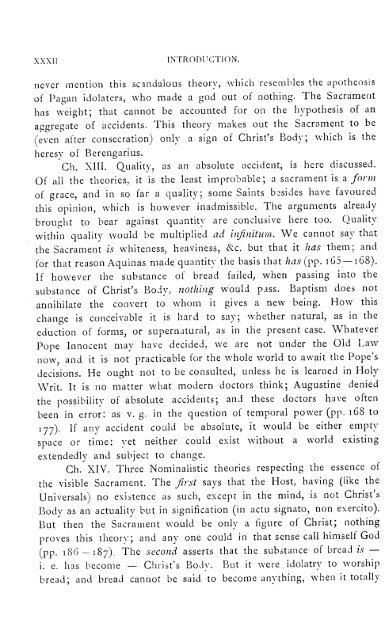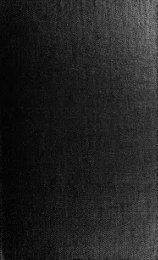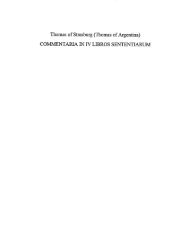You also want an ePaper? Increase the reach of your titles
YUMPU automatically turns print PDFs into web optimized ePapers that Google loves.
XXXII<br />
INTRODUCTION.<br />
never mention this scandalous theory, which resembles the apotheosis<br />
of Pagan idolaters, who ma<strong>de</strong> a god out of nothing. The Sacrament<br />
has weight; that cannot be accounted for on the hypothesis<br />
of an<br />
aggregate of acci<strong>de</strong>nts. This theory makes out the Sacrament to be<br />
(even after consecration) only a sign of Christ's Body; which is the<br />
heresy of Berengarius.<br />
Ch. XIII. Quality, as an absolute acci<strong>de</strong>nt, is here discussed.<br />
Of all the theories, it is the least improbable; a sacrament is a form<br />
of grace, and in so far a quality; some Saints bssi<strong>de</strong>s have favoured<br />
this opinion, which is however inadmissible. The arguments already<br />
brought to bear against quantity are conclusive here too. Quality<br />
within quality would be multiplied ad infinitum. We cannot say that<br />
the Sacrament is whiteness, heaviness, &c. but that it has them; and<br />
for, that reason Aquinas ma<strong>de</strong> quantity the basis that has (pp. i65— 168).<br />
If however the substance of bread failed, when passing into the<br />
substance of Christ's Body, nothing would pass. Baptism<br />
does not<br />
annihilate the convert to whom it gives a new being. How this<br />
change is conceivable it is hard to say; whether natural, as in the<br />
eduction of forms, or supernatural,<br />
as in the present case. Whatever<br />
Pope Innocent may have <strong>de</strong>ci<strong>de</strong>d, we are not un<strong>de</strong>r the Old Law<br />
now and it is not for<br />
practicable<br />
the whole world to await the Pope's<br />
<strong>de</strong>cisions. He ought not to be consulted, unless he is learned in Holy<br />
Writ. It is no matter what mo<strong>de</strong>rn doctors think; Augustine <strong>de</strong>nied<br />
the possibility<br />
been in error:<br />
of absolute<br />
as v.<br />
g.<br />
in<br />
acci<strong>de</strong>nts; and these doctors have often<br />
the question of temporal power (pp. 168 to<br />
177).<br />
If any acci<strong>de</strong>nt could be absolute, it would be either empty<br />
space or time: vet neither could exist without a world existing<br />
exten<strong>de</strong>dly and subject to change.<br />
Ch. XIV. Three Nominalistic theories respecting the essence of<br />
the visible Sacrament. The first says that the Host, having (like the<br />
Universals) no existence as such, except in the mind,<br />
is not Christ's<br />
Body as an actuality but in signification (in actu signato, non exercito).<br />
But then the Sacrament would be only a figure of Christ; nothing<br />
proves this theory; and any one could in that sense call himself God<br />
(pp. 186-187). The second asserts that the substance of bread is —<br />
i. e. has become — Christ's Body. But it were idolatry to worship<br />
bread; and bread cannot be said to become anything, when it totally

















